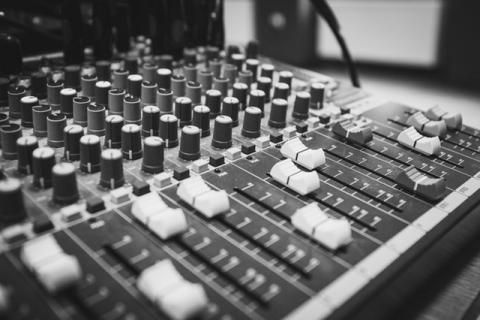
When we think about music composition, we’re often thinking about the finished product – the final song – rather than the process itself. But composing music is a powerful tool of humanity that can improve one’s own life as well as the lives of others. There are numerous health benefits to composing music.
Let’s take a closer look at one musician’s process, and then reflect on the health benefits that emerge from it.
One Musician’s Composition Process
In my one room, live-in studio on the hill, a smidgeon north of the Golden Gate Bridge, I dim the lights to a fluorescent, magenta glow. I carelessly, yet deliberately flick on the knob of my recording mini-speakers, prompting an unwavering, neon blue circle. I plug in the Midi keyboard to my Mac. More blue lights appear on the now juiced synthesizer. I insert my “ginormous” blue snowball orb of a microphone into the Mac’s USB port, prompting a steady red light. Ready to roll, I ignite my pseudonym, Jacque D’Artichoke’s, calculated rendition of post-1980s pop/rock euphoria!
My studio enclave, like my attention, is fully insulated from the torrential weather outside, while still summoning a whirlwind of the elements! The outside world is tuned out by my honed concentration on melodious creation, allowing me to relax. The only turbulence I must direct hearkens from my probing mind. Thus music creation, like a writer’s composition, both requires and generates remarkable focus.
Songwriters immortalize paradigmatic entities.
The recording session is a sanctuary from figment conception to as much of a completion as I am going to throw down. Songwriters immortalize paradigmatic entities. I forage for a harmonic revolution with keyboard chords and drum beats, samples of various instruments from 61 keys. They are all thrown together in a merry cacophony of several, merged tracks into one master. Sometimes aided by a lone Brooks Dry Cider, I figure stuff out that complements other stuff and contributes to the piece’s thematic development.
My original music offers a blueprint of my identity.
Even though I like to think I am an “up-and-coming author and a down-and-deafening musician,” I have a strong sense of resonance from endlessly craving pop music from the 1980s as a teenager. Often times, there is a harmonious progression throughout my tunes that leads to a resolution or overall sense of the “genome-coded” composer’s minty “aftertaste.” The various, connected musical segments establish a logical order, an emotional progression into my mind’s expectations, accentuations, and punctuations. Thus, my original music offers myself and others a sparking blueprint of my partial identity. My songs remind me of who I am, who I once was, and who I aspire to become. This sense of knowing one’s self is imperative to one’s relationship with larger, life schematics. It provides the “how” that partially answers the “why.” Lyrics add additional depth perception. One’s music deals with individual philosophy, psychology, spirituality, inner focus, fiery outlook, socio-politico-economic subscription, and/or mere idiosyncratic proclivity.
"Lone Bear," a song on Cosmic Bear, my recently released pop/dance EP on iTunes, echoes an emotional reverberation inherent to every barbarious court squatter who has ever sang the song of life or waxed poetic, either artistically or via experiential living. Like many other composers, my original music speaks to the too spartan outspokenness regarding the human condition, the necessity of striving for excellence, and the spiritual feasibility of hope. All of the above are healthy aspirations that emanate from a composer’s music. One’s song is like a long-gestating, baby descendant that has sprung, grown, out of a person’s mind.
Benefits of Composing Music
Thus, the health benefits of composing music are manifold:
- Music composition requires intense focus, improving your ability to concentrate and keeping your mind sharp.
- Music composition can evoke powerful emotions in you yet also be a relaxing activity.
- Music that you create offers yourself and others an immortal blueprint of your identity that they might relate to.
- Composing music deals with diverse facets of human consciousness, including individual philosophy, psychology, spirituality, inner focus, fiery outlook, socio-politico-economic subscription, and/or mere idiosyncratic proclivity.
- Music creation speaks to the valleys as well as the peaks of the human condition.
- Creating a song provides you with a sense of pride and accomplishment, as the song sprung out of the songwriter’s mind into a new entity of its own.
Next time you’re looking for a way to release some creative juices, try making some music. And don’t worry about the finished product, the song – focus on the process, your emotions as you create, and the way that doing so connects you to the larger collective of humanity.








